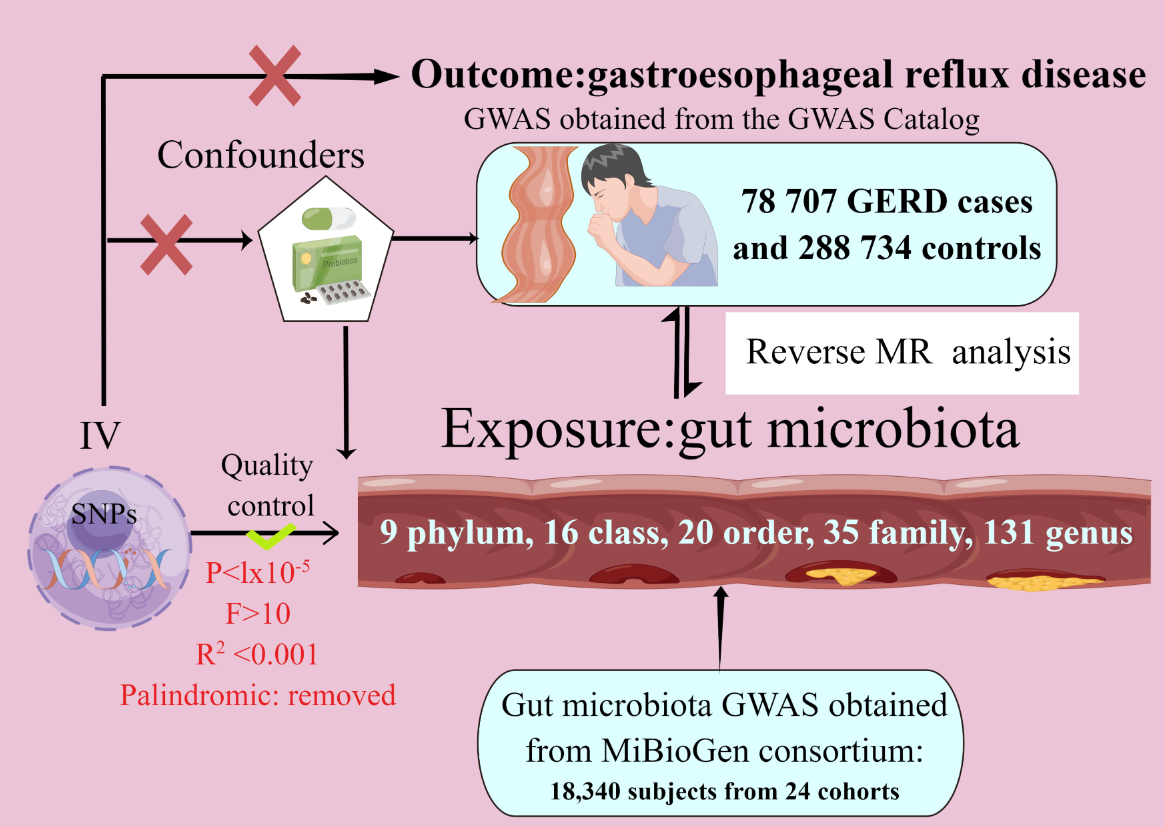Gastroesophageal reflux disease (GERD) is a prevalent gastrointestinal disorder characterized by the reflux of stomach contents into the esophagus, leading to symptoms such as heartburn and regurgitation. Observational studies have suggested a link between the gut microbiota and GERD, but causality has not been definitively established. This study aimed to investigate the causal association between gut microbiota composition and GERD using Mendelian randomization (MR) analysis.
Methods: The study utilized genome-wide association study (GWAS) data from the MiBioGen consortium, comprising 18,340 samples from 24 population-based cohorts, as the exposure dataset for gut microbiota composition. Summary-level data for GERD were obtained from a recent GWAS involving 78,707 GERD cases and 288,734 controls of European descent. MR analysis was conducted using the inverse variance-weighted (IVW) method as the primary analysis, supported by additional methods such as sensitivity analyses and reverse MR to assess potential reverse causation.
Key Scientific Findings:
- Microbiota Associations with GERD Risk:
- Protective roles against GERD were observed for the Family Clostridiales Vadin BB60 group, Genus Lachnospiraceae UCG004, Genus Methanobrevibacter, and Phylum Actinobacteria.
- Potential risk factors for GERD included Class Mollicutes, Genus Anaerostipes, and Phylum Tenericutes.
- Reverse Causation Analysis:
- Reverse MR analysis indicated that GERD leads to dysbiosis in 13 distinct gut microbiota classes, suggesting a bidirectional relationship between GERD and gut microbiota composition.
- Biological Pathways Implicated:
- Certain microbial taxa associated with GERD, such as Phylum Actinobacteria, Family Clostridiales Vadin, and Genus Methanobrevibacter, are involved in the biosynthesis of Short-chain fatty acids (SCFAs).
- SCFAs play essential roles in colonic motility regulation, intestinal barrier integrity, and immune modulation, potentially influencing GERD pathogenesis.
- Consistency with Previous Research:
- Findings align with previous studies indicating associations between specific gut microbiota alterations and GERD risk.
- Differential microbiota compositions have been observed in GERD patients compared to control individuals, suggesting a potential role for gut dysbiosis in GERD pathophysiology.
This study contributes to the understanding of the complex interplay between gut microbiota and GERD. By leveraging MR analysis, causal associations between specific microbial taxa and GERD risk were identified. These findings have implications for diagnostic and therapeutic approaches in GERD management, emphasizing the potential of modulating the gut microbiota as a preventive and therapeutic strategy. Further research is needed to validate these findings and elucidate underlying mechanisms.
Link to the Article : http://tinyurl.com/35dj89aj
